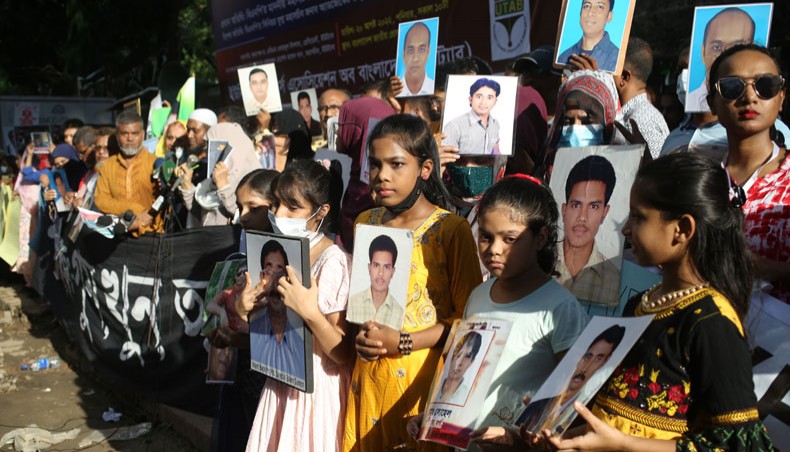ENFORCED DISAPPEARANCES Families of victims renew calls for impartial probe

Family members of enforced disappearance victims have renewed their call for an independent inquiry under the supervision of the United Nations as regular investigations failed to hold perpetrators accountable and ensure justice for them.
They made the call ahead of the United Nations International Day of the Victims of Enforced Disappearances, which will be observed today.
The day has been observed since 2011 following reports of a growing number of incidents of enforced disappearance in various regions of the world.
The Hong Kong-based Asian Human Rights Commission reported that at least 605 people were victims of disappearance after their abduction by law-enforcement agencies in Bangladesh between January 2009 and September 2021.
Among those who disappeared, 81 were found dead and 154 remained missing during that period, many of them were found in jail, arrested or dropped alive in different places.
In a separate report, New York-based Human Rights Watch said the whereabouts of 86 remained unknown for years.
Family members of the victims said they were not getting any support from the state agencies in getting justice but vowed to continue their struggle to find their disappeared family members and ensure justice.
Several victims, who were illegally detained for a short or long duration at different times, and their family members, said that getting justice was an illusion for them.
Jurist Shahdeen Malik said that those who are committing crimes relating to disappearances in Bangladesh must face the music of the law sooner or later.
He said that if the state failed to punish them, the country would turn into a country like Afghanistan, Syria, Libya, or the Democratic Republic of Congo.
‘None of us wants our society or country to become a lawless country,’ he told New Age on the eve of UN International Day of the Victims of Enforced Disappearances.
The wife of missing Mirpur-based trader Ismail Hossain, Nasrin Jahan Smrity, alleged that a navy official deputed to the Rapid Action Battalion was behind the disappearance of her husband from the capital’s Mirpur on June 19, 2019. RAB denied the allegation.
She said that the state should find the perpetrators but that it was not happening.
‘We are helpless but not frustrated. I will continue my struggle to get justice as I want to know the whereabouts of my husband,’ she said.
Smrity said that they had no faith in law enforcement agencies as they often interrogated the family to come up with nothing.
Mahfuza Akhter said that her family had been devastated after her father, opposition lawmaker Chowdhury Alam, was kidnapped off the capital’s Indira Road on June
‘We want to know where our father is. Getting justice has become tougher for us in his absence,’ she said.
Chowdhury Alam was the councillor of ward 56 of the then undivided Dhaka City Corporation and a key organiser known for mobilising street protests in the capital.
The Dhaka-based Centre for Governance Studies stated in a report on Monday that 593 incidents of enforced disappearance were reported between 2009 and 2021.
The CGS analysed 71 cases and stated that 11 of them were politicians and businessmen, while eight others were students.
Ain O Salish Kendra executive director Nur Khan Liton said that families of disappearance victims suffer terribly as they hardly know where to go to seek justice, remain confused about whether to hold a prayer for an alive or dead person and cannot inherit the wealth of a missing person.
He said that the family members lost their faith in the law enforcement agencies due to their role following the report of each case of disappearance in the past decade and more.
As alleged by his family members, Imam Mahady Hasan Dollar, 30, a fish trader from Mymensingh district, became a victim of disappearance on November 6, 2021, when he was dragged into a microbus and brought to Dhaka.
In a press conference later, his family alleged that the last location of his mobile was near the Rapid Action Battalion office in Uttara.
His family members on Monday said he returned home on Saturday, 10 months after his disappearance, but remained silent about his whereabouts during the period of his disappearance.
‘He is still traumatised. We do not know where he was,’ Imam’s wife Mumta Hana Pinkey told New Age.
The outgoing United Nations human rights high commissioner, Michelle Bachelet, during her visit to Bangladesh on August 17, said that the Bangladesh government should acknowledge the allegations of enforced disappearances and extrajudicial killings and investigate them impartially.
Home minister Asaduzzaman Khan disputed the allegations of human rights abuses in Bangladesh and said many went into hiding due to business losses, family feuds, or to avoid the justice system.
On Monday, the International Federation for Human Rights, the Asian Federation Against Involuntary Disappearances, Mayer Daak, and Odhikar said in a joint statement that the Bangladeshi government has consistently denied all cases of enforced disappearance, despite evidence and reports corroborating claims by the families of the disappeared that their loved ones were taken by security forces.
The statement said enforced disappearances have been used as a tool to curb criticism against the government and create a climate of fear.
They also urged the Bangladesh authorities to set up an independent mechanism to investigate all cases of enforced disappearances to hold all perpetrators accountable and ratify the International Convention for the Protection of All Persons from Enforced Disappearance.
Mizanur Rahman, a former chairman of the National Human Rights Commission, found investigation into the disappearance difficult as it left hardly any evidence when state agencies were involved.
He was critical of Michelle Bachelet for not raising the issue of enforced disappearance in her final press conference in Geneva on August 25, as her silence, Mizanur believed, would reduce the scope for public discussion on enforced disappearance.
News Courtesy:
